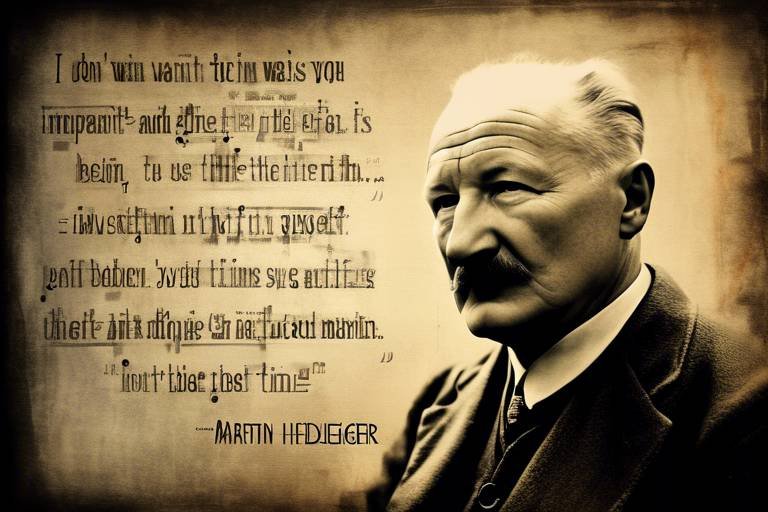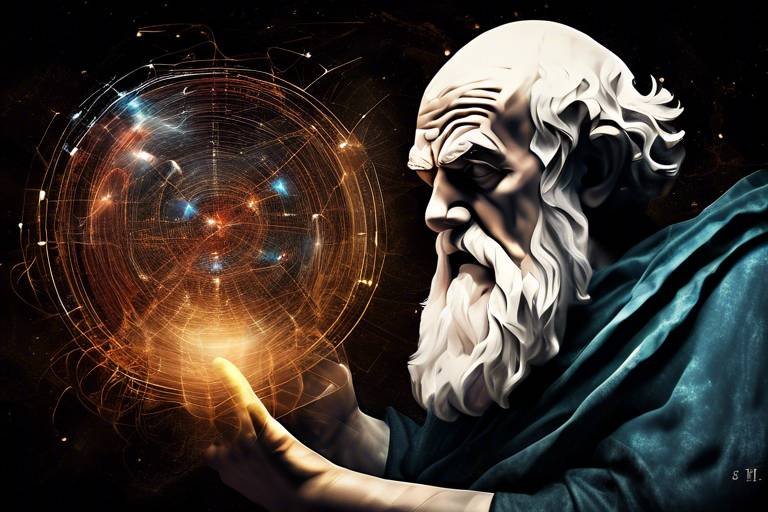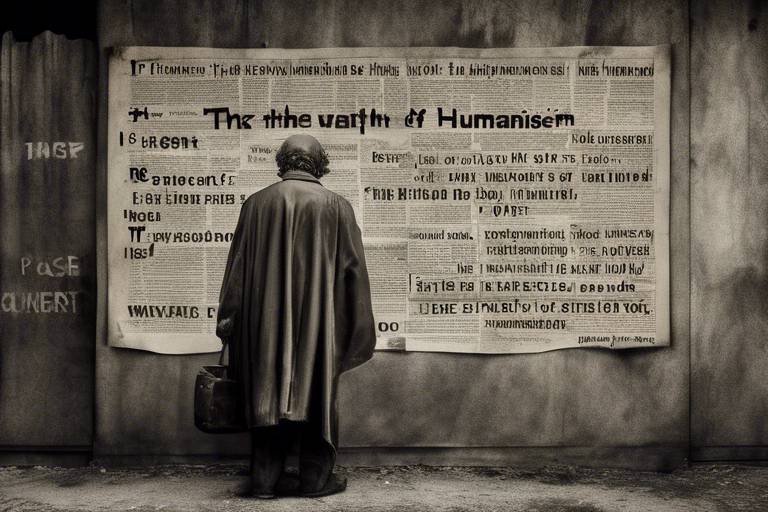Exploring the Philosophical Underpinnings of Nihilism
Nihilism, a term that often evokes a sense of dread or confusion, is a fascinating philosophical perspective that challenges our understanding of meaning, morality, and existence itself. At its core, nihilism posits that life lacks inherent meaning, purpose, or value. This may sound bleak, but it invites us to explore the depths of our beliefs and question the very fabric of societal norms. Can you imagine living in a world where the guiding principles of morality and existence are stripped away? That's the existential landscape nihilism presents us with.
The origins of nihilism can be traced back through various philosophical traditions, from ancient Greece to modern existential thought. It isn't merely a modern phenomenon; rather, it has evolved through centuries of intellectual discourse. Key figures throughout history have contributed to this complex tapestry, each adding their unique threads to the fabric of nihilistic thought. By examining these influences, we can better understand how nihilism emerged and how it continues to shape philosophical discussions today.
One of the most significant aspects of nihilism is its impact on morality. Traditional moral frameworks often rely on the belief that there is a universal truth or objective standard that guides ethical behavior. However, nihilism challenges these notions, suggesting that these moral systems are not as solid as they seem. This raises profound questions: If morality is subjective and constructed, what does it mean to live a good life? How do we navigate ethical dilemmas in a world where meaning is not predetermined?
As we delve deeper into the philosophical underpinnings of nihilism, we encounter key thinkers like Friedrich Nietzsche and Jean-Paul Sartre, who have profoundly influenced the discourse surrounding this ideology. Nietzsche's provocative ideas, such as the death of God and the will to power, challenge us to rethink our values and embrace a more dynamic approach to existence. On the other hand, Sartre's existentialism intersects with nihilism, emphasizing personal freedom and responsibility in a universe that may seem indifferent to our struggles.
Ultimately, exploring nihilism is not merely an academic exercise; it's a journey into the heart of what it means to be human. It forces us to confront uncomfortable truths about our beliefs and the structures that govern our lives. In a world that often feels chaotic and devoid of meaning, nihilism can serve as a catalyst for personal growth and self-discovery. It encourages us to create our own meanings and values, rather than relying on those imposed by society.
As we navigate through this philosophical landscape, it’s essential to recognize the relevance of nihilism in contemporary society. From art to politics, nihilistic themes resonate in various cultural expressions, reflecting the ongoing struggle for meaning and purpose in an ever-changing world. So, as we continue this exploration, let’s keep an open mind and embrace the complexities that nihilism brings to our understanding of existence.
- What is nihilism? Nihilism is a philosophical perspective that asserts that life lacks inherent meaning, purpose, or value.
- Who are the key philosophers associated with nihilism? Prominent figures include Friedrich Nietzsche and Jean-Paul Sartre, each contributing unique insights into the nature of existence and morality.
- How does nihilism impact morality? Nihilism challenges traditional moral frameworks, suggesting that moral values are subjective and constructed rather than universal truths.
- Is nihilism a negative philosophy? While nihilism can seem bleak, it can also be liberating, encouraging individuals to create their own meanings and values.
- How is nihilism relevant today? Nihilistic themes are prevalent in contemporary culture, art, and politics, reflecting society's ongoing struggles with meaning and purpose.

The Origins of Nihilism
Nihilism, a term that often evokes strong reactions, has a rich and complex history that stretches back through various philosophical traditions. Its origins can be traced to ancient philosophies, where the seeds of skepticism and questioning the nature of reality were first sown. In essence, nihilism posits that life lacks inherent meaning, purpose, or intrinsic value, a notion that has evolved significantly over the centuries.
To understand nihilism's roots, we must delve into the philosophical landscape of ancient Greece and Rome. Thinkers like Democritus and the Epicureans laid the groundwork by proposing that the universe is composed of atoms and void, suggesting a materialistic view that undermined metaphysical constructs. Their ideas hinted at a world devoid of divine purpose, paving the way for later nihilistic thought.
Fast forward to the 19th century, and we see the emergence of nihilism as a distinct philosophical movement, heavily influenced by the works of Friedrich Nietzsche. Nietzsche's writings, particularly in "Thus Spoke Zarathustra" and "The Gay Science," brought nihilism to the forefront of philosophical discourse. He famously declared the "death of God," a metaphorical proclamation that signified the decline of traditional religious and moral frameworks. This declaration forced individuals to confront the implications of a world stripped of absolute truths and inherent meaning.
Moreover, the existentialist movement, which gained momentum in the early 20th century, further shaped nihilistic thought. Philosophers like Jean-Paul Sartre embraced the notion that existence precedes essence, meaning that individuals are free to create their own values in a universe that offers no preordained purpose. This shift highlighted a crucial aspect of nihilism: while it acknowledges the absence of inherent meaning, it also emphasizes the responsibility of individuals to forge their own paths.
In summary, the origins of nihilism are deeply intertwined with the evolution of philosophical thought. From ancient materialism to modern existentialism, nihilism has emerged as a response to the complexities of existence, morality, and the search for meaning. As we continue to explore this fascinating philosophy, it becomes clear that nihilism is not merely a rejection of meaning but a profound invitation to engage with the world on our own terms.

Key Philosophers of Nihilism
Nihilism, as a philosophical stance, has been shaped by the thoughts and writings of several influential thinkers. Among these, Friedrich Nietzsche and Jean-Paul Sartre stand out for their profound contributions to the discourse surrounding meaning, existence, and morality. Their ideas not only challenge established norms but also provoke deep introspection about the human condition and our place in the universe. Let's dive deeper into their philosophies and how they intertwine with nihilism.
Friedrich Nietzsche, often regarded as the father of nihilism, introduced a radical critique of traditional morality. He argued that established moral systems, particularly those rooted in religion, are unfounded and serve as constraints on human potential. Nietzsche famously declared that "God is dead," a provocative statement that symbolizes the decline of religious authority and metaphysical certainty in the modern world. This declaration forces us to confront the implications of a world devoid of inherent meaning, pushing us toward a nihilistic perspective that questions the very foundations of ethical beliefs.
Nietzsche's examination of morality leads us to the heart of nihilism: the idea that without a divine or universal standard, morality becomes subjective. This perspective opens up a Pandora's box of questions: If morality is a human construct, what does that mean for our ethical frameworks? Are we free to create our own values, or are we bound by societal norms? Nietzsche believed that this freedom is both exhilarating and terrifying, as it places the burden of meaning squarely on our shoulders.
The implications of Nietzsche's proclamation about the "death of God" are far-reaching. It signals the end of an era where religious beliefs provided a clear moral compass. In a world where God no longer holds sway, individuals must grapple with the existential void left in his absence. This void can lead to feelings of despair, but Nietzsche saw it as an opportunity for a profound re-evaluation of values. He urged individuals to embrace this uncertainty and to forge their own paths, thus giving rise to a new form of morality grounded in personal experience rather than dogma.
Central to Nietzsche's philosophy is the concept of the will to power, which serves as a counterpoint to nihilism. Rather than succumbing to despair, Nietzsche proposed that we should channel our existential anxiety into a creative force that drives us to assert our own values and meanings. The will to power encourages a proactive approach to existence, suggesting that we can shape our destinies rather than being passive victims of fate. This idea resonates with the notion that life, while inherently devoid of meaning, can be infused with purpose through our actions and choices.
Turning to Jean-Paul Sartre, we find another pivotal figure in the realm of nihilism. Sartre's existentialism intersects with nihilistic themes, particularly his emphasis on individual freedom and responsibility. He famously stated that "existence precedes essence," implying that humans are not born with a predetermined purpose but instead create their own meaning through choices and actions. This perspective aligns with nihilism in that it acknowledges the absence of inherent meaning in life, yet it diverges by asserting that individuals have the power to define their own existence.
Sartre's philosophy invites us to embrace our freedom, even in a seemingly indifferent universe. He challenges us to confront the absurdity of life while simultaneously urging us to engage with it authentically. In this way, Sartre's existential nihilism offers a pathway out of despair, suggesting that through our choices, we can carve out our own significance amidst the chaos.
In summary, the key philosophers of nihilism—Nietzsche and Sartre—offer profound insights into the complexities of meaning and existence. Their works challenge us to question our beliefs, confront the void left by traditional morality, and ultimately empower us to create our own values in a world that often feels devoid of meaning.
- What is nihilism? Nihilism is a philosophical viewpoint that suggests life lacks inherent meaning, purpose, or value.
- Who are the main philosophers associated with nihilism? The most notable philosophers include Friedrich Nietzsche and Jean-Paul Sartre, who explored themes of meaning, existence, and morality.
- How does nihilism relate to morality? Nihilism challenges conventional moral frameworks by asserting that moral values are subjective and not grounded in any universal truth.
- Can nihilism lead to despair? While nihilism can evoke feelings of despair due to its rejection of inherent meaning, it can also inspire individuals to create their own purpose and values.

Nietzsche's Critique of Morality
Friedrich Nietzsche, one of the most provocative philosophers of the 19th century, took a bold stance against traditional morality. He argued that our established moral systems are not only flawed but fundamentally unfounded. To Nietzsche, the moral values that have been handed down through generations are mere constructs, shaped by cultural and historical contexts rather than any universal truths. This perspective leads to a nihilistic worldview, where the very basis of ethical beliefs is called into question.
Nietzsche believed that morality is often a tool wielded by the powerful to control the weak. He famously critiqued the morality of his time as being rooted in notions of guilt, sin, and self-denial, which he saw as detrimental to human flourishing. Instead of adhering to these imposed moral codes, Nietzsche advocated for a revaluation of values. He encouraged individuals to create their own values and to live authentically, free from the constraints of societal expectations.
To illustrate his critique, Nietzsche introduced the concept of the Übermensch or "Overman." This idea represents an individual who transcends traditional moral boundaries and creates their own path in life. The Übermensch embraces the chaos of existence and recognizes that life is devoid of inherent meaning, thus choosing to impose their own meaning onto their experiences. This radical individualism challenges us to reconsider our relationship with morality and the extent to which we allow societal norms to dictate our lives.
Furthermore, Nietzsche's declaration of the death of God symbolizes the decline of religious and metaphysical certainty, which he believed was crucial for the foundation of moral values. With the "death" of these certainties, individuals are left in a state of existential crisis, grappling with the absence of a divine moral compass. Nietzsche argued that this void could lead to nihilism, where life appears meaningless, yet he saw it as an opportunity for liberation. In the absence of preordained morals, individuals are free to shape their own destinies.
Nietzsche's critique of morality ultimately invites us to reflect on our ethical beliefs. Are they genuinely ours, or have we merely inherited them? By confronting these questions, we can begin to forge a more authentic existence. This existential questioning is not just philosophical; it has practical implications for how we engage with the world and with each other. In a society where traditional moral frameworks are increasingly challenged, Nietzsche's ideas remain profoundly relevant.
In conclusion, Nietzsche's critique of morality serves as a powerful reminder of the importance of questioning the values we hold. His call for a revaluation of values encourages us to break free from societal constraints and to embrace the freedom that comes with creating our own meaning. As we navigate the complexities of modern life, Nietzsche's insights provide a compelling framework for understanding morality in a world that often feels chaotic and uncertain.
- What is Nietzsche's view on morality? Nietzsche believed that traditional moral values are unfounded and serve as tools of control. He advocated for the creation of personal values.
- What does the term Übermensch mean? The Übermensch, or "Overman," is an idealized individual who transcends conventional morality and creates their own meaning in life.
- How does Nietzsche's concept of the death of God relate to morality? The death of God symbolizes the loss of religious and metaphysical certainty, leading to a crisis in moral values and the opportunity for individuals to create their own ethics.

The Death of God
Friedrich Nietzsche's proclamation of the death of God is one of the most provocative and profound assertions in modern philosophy. This metaphorical declaration symbolizes the decline of traditional religious beliefs and the metaphysical certainties that have long governed human thought. In a world where God is dead, Nietzsche posits that humanity is left grappling with the void that this absence creates. Imagine a ship lost at sea, devoid of its compass; this is how Nietzsche perceives a society stripped of its divine guidance. The implications of this idea are staggering, as it challenges individuals to confront the reality that there is no inherent meaning bestowed upon existence.
Nietzsche's assertion does not merely reflect a personal crisis of faith but rather serves as a critique of the entire moral framework that has been built upon religious foundations. With the death of God, the question arises: What remains of morality? If traditional moral values are no longer anchored in divine authority, then they must be reevaluated. Nietzsche argues that this void calls for a new understanding of morality, one that is not dictated by an external source but rather created by the individual. This shift places the responsibility of meaning-making squarely on human shoulders, igniting a sense of both freedom and anxiety.
In this new landscape, the absence of God prompts a reevaluation of ethical systems. Nietzsche challenges us to consider:
- How do we define right and wrong without divine command?
- What motivates ethical behavior when traditional incentives are stripped away?
- Can we create values that are genuinely our own?
Ultimately, Nietzsche's declaration serves as a call to arms for those willing to embrace the chaos of a godless universe. It encourages individuals to become creators of their own values, to rise above nihilism by embracing the will to power—a concept that champions the idea of self-affirmation and the pursuit of personal excellence. In this light, the death of God is not merely an end but also a beginning, opening the door to new possibilities for meaning and existence.
As we navigate the complexities of a world devoid of divine oversight, the implications of Nietzsche's thought resonate deeply in contemporary discourse. The struggle for meaning persists, as individuals and societies alike grapple with the existential questions that arise in the wake of this philosophical revolution. The death of God, therefore, becomes not just a historical event but a continuous challenge, urging us to seek out our own paths in a universe that offers no easy answers.
What does Nietzsche mean by the "death of God"?
Nietzsche's "death of God" refers to the decline of religious and metaphysical beliefs that provide meaning and moral guidance. It symbolizes a shift in human consciousness where traditional values are questioned and redefined.
How does the death of God affect morality?
With the absence of divine authority, morality must be reevaluated. Nietzsche suggests that individuals must create their own values and ethical frameworks rather than rely on established norms.
What is the "will to power"?
The "will to power" is Nietzsche's concept that emphasizes the drive for self-assertion and personal excellence. It serves as a counterpoint to nihilism, suggesting that individuals can create meaning through their actions and choices.
Is nihilism a negative philosophy?
While nihilism is often viewed as bleak, Nietzsche argues that it can lead to empowerment. By confronting the void left by the death of God, individuals have the opportunity to forge their own paths and define their own values.

death of God,
Friedrich Nietzsche's proclamation of the death of God is one of the most provocative and misunderstood concepts in modern philosophy. When Nietzsche declared that "God is dead," he wasn't merely stating a fact; he was highlighting a profound shift in the human experience and the implications it holds for morality and meaning in life. This declaration signifies the decline of traditional religious beliefs, which had long provided a framework for understanding existence, ethics, and purpose.
In a world where the divine is no longer a guiding force, Nietzsche suggests that humanity is faced with a daunting void. This absence of an absolute moral compass leads to a state of nihilism, where values become subjective, and the quest for meaning becomes a personal endeavor. The implications of this "death" are monumental:
- Loss of Absolute Values: Without a divine authority, the foundation of established morality crumbles, leaving individuals to navigate a world devoid of universal truths.
- Existential Freedom: While this might seem terrifying, Nietzsche viewed it as an opportunity for individuals to create their own values and meanings. Freedom comes with the responsibility to define one's existence.
- Reevaluation of Life: The death of God challenges individuals to confront the absurdity of life and to find significance in their experiences, rather than relying on external validation.
Nietzsche's assertion doesn't merely reflect a personal crisis of faith; it encapsulates a cultural phenomenon. As modernity progressed, the Enlightenment brought forth rationality and scientific inquiry, leading many to question the metaphysical foundations of religious beliefs. This cultural shift resulted in a society that often grapples with feelings of alienation and disillusionment as the once comforting narratives of religion give way to a more fragmented understanding of existence.
Moreover, Nietzsche's proclamation is not a call to despair but rather an invitation to embrace the chaos of life. He urges individuals to confront the implications of a godless universe with courage and creativity. This existential challenge leads to the concept of the Übermensch or "Overman," who embodies the ability to transcend traditional values and create a new set of principles based on personal experience and strength.
In essence, the death of God serves as a catalyst for profound philosophical inquiry. It forces us to reconsider the nature of existence, the foundations of morality, and the potential for authentic living in a world where meaning is not handed down from above but must be forged from within. As we navigate this complex landscape, Nietzsche’s insights encourage us to embrace our freedom and responsibility, urging us to find our own path in a universe that offers no easy answers.
What does the phrase "God is dead" mean?
This phrase, coined by Nietzsche, signifies the decline of traditional religious beliefs and the implications this has for morality and meaning in life. It suggests that humanity must now navigate existence without the guidance of a divine authority.
How does the death of God relate to nihilism?
The death of God leads to nihilism by challenging the existence of absolute values and truths. Without a divine moral framework, individuals may struggle to find meaning and purpose, resulting in a worldview where values are seen as subjective.
What is the significance of the Übermensch in Nietzsche's philosophy?
The Übermensch, or "Overman," represents an individual who transcends traditional values and creates their own meaning in life. This concept embodies Nietzsche's call for individuals to embrace their freedom and responsibility in a godless universe.

symbolizing the decline of religious and metaphysical certainty. This section explores the implications of this declaration for nihilism and modern existential thought.
Nihilism has roots in various philosophical traditions. This section explores its historical development, tracing influences from ancient philosophies to modern existentialism, highlighting key figures who shaped its evolution.
Several prominent philosophers have contributed to nihilistic thought. This section discusses influential thinkers such as Friedrich Nietzsche and Jean-Paul Sartre, analyzing their perspectives and arguments regarding meaning and existence.
Friedrich Nietzsche's ideas on morality challenge traditional values. This subheading examines his assertion that established moral systems are unfounded, leading to a nihilistic worldview that questions the very basis of ethical beliefs.
Nietzsche famously proclaimed the death of God, symbolizing the decline of religious and metaphysical certainty. This declaration wasn't just a statement about belief; it was a profound shift in the landscape of human thought. By declaring that "God is dead," Nietzsche suggested that the traditional sources of meaning and moral guidance were no longer tenable in the modern world. This creates a vacuum where once there was certainty, leaving individuals to grapple with the implications of a universe devoid of inherent meaning.
The implications of this declaration for nihilism are multifaceted. Firstly, it challenges individuals to confront the reality that they must create their own values and purposes in a seemingly indifferent universe. This can be both liberating and daunting. The absence of a divine moral compass means that individuals are left to navigate their existence without predetermined guidelines, leading to a sense of existential freedom. However, this freedom can also lead to feelings of despair and confusion as people wrestle with the question: What is the point of it all?
In modern existential thought, Nietzsche's proclamation has sparked debates about the nature of existence and the search for meaning. It has led thinkers to explore various responses to nihilism, such as:
- Creating personal meaning: Individuals are encouraged to find or create their own significance in life.
- Embracing absurdity: Some philosophers, like Albert Camus, argue that acknowledging the absurdity of existence can lead to a more authentic life.
- Revaluation of values: Nietzsche himself proposed that in the absence of divine morality, humans must re-evaluate and redefine their values.
Thus, Nietzsche's declaration serves as a catalyst for a broader philosophical inquiry into the nature of existence. It forces us to confront uncomfortable truths and encourages a shift from passive acceptance of inherited beliefs to an active engagement with the world. This engagement is not just an intellectual exercise; it has profound implications for how we live our lives and relate to one another in a society that often yearns for meaning.
Nietzsche's concept of the will to power serves as a counterpoint to nihilism. This subheading discusses how this idea proposes a revaluation of values and a proactive approach to existence.
Jean-Paul Sartre's existentialism intersects with nihilism, emphasizing individual freedom and responsibility. This section analyzes how Sartre's views contribute to the understanding of meaning in a seemingly indifferent universe.
The relationship between nihilism and morality raises profound questions. This section investigates how nihilistic thought challenges conventional moral frameworks and what it means for ethical behavior and societal norms.
Nihilism's rejection of inherent meaning poses challenges for ethical theories. This subheading explores various responses to nihilism and the potential for developing a new ethical framework in its wake.
Nihilism's relevance persists in modern discourse. This section examines how nihilistic themes manifest in contemporary culture, art, and politics, reflecting society's ongoing struggle with meaning and purpose.
- What is nihilism? Nihilism is a philosophical belief that life lacks inherent meaning, purpose, or value.
- Who is the main philosopher associated with nihilism? Friedrich Nietzsche is often associated with nihilism, particularly through his declaration of the "death of God."
- How does nihilism affect morality? Nihilism challenges conventional moral frameworks, suggesting that moral values are not absolute but rather constructed by individuals.
- Is nihilism a negative philosophy? While nihilism can lead to despair, it can also promote personal freedom and the creation of individual meaning.

Will to Power
The concept of the is one of Friedrich Nietzsche's most profound and provocative ideas, serving as a cornerstone of his philosophical framework. At its core, the Will to Power suggests that the fundamental driving force in humans is not merely survival or reproduction, but rather an intrinsic desire to assert and enhance one's influence and creativity in the world. This notion flips the traditional view of human motivation on its head, suggesting that we are not just passive recipients of life's circumstances but active participants striving to shape our destinies.
Nietzsche posits that this drive manifests in various forms, from the pursuit of knowledge and artistic expression to the quest for personal and social dominance. In a world where nihilism questions the existence of objective values, the Will to Power offers a potential pathway to reclaim meaning. It encourages individuals to forge their own values and realities, rather than relying on externally imposed moral systems that may no longer hold relevance in a post-religious society.
To illustrate this idea, consider the following table that contrasts traditional moral values with Nietzsche's Will to Power:
| Traditional Morality | Will to Power |
|---|---|
| Emphasizes conformity and obedience | Encourages individual expression and creativity |
| Seeks universal truths | Values personal perspective and subjective experience |
| Defines right and wrong through external standards | Allows for self-defined values and ethics |
By embracing the Will to Power, individuals are invited to engage in a revaluation of values, challenging the status quo and redefining what it means to live a meaningful life. This proactive approach to existence empowers people to take ownership of their beliefs and actions, transforming them from mere followers of societal norms into architects of their own destinies. Nietzsche believed that through this lens, one could find a sense of purpose even in a seemingly indifferent universe.
However, it is essential to acknowledge that the Will to Power is not without its challenges. The potential for domination and exploitation exists when individuals pursue their desires at the expense of others. Thus, Nietzsche's philosophy calls for a careful balance—one that recognizes the importance of personal power while also considering the implications of that power on the broader community.
In summary, the Will to Power serves as a powerful antidote to nihilism, urging individuals to embrace their potential for creativity and influence. It challenges us to rise above passive acceptance of life's circumstances and instead, to actively shape our own realities. By doing so, we can navigate the complexities of existence with a renewed sense of purpose and meaning.
- What is the Will to Power?
The Will to Power is a philosophical concept introduced by Nietzsche, suggesting that the primary driving force in humans is the desire to assert and enhance their influence and creativity.
- How does the Will to Power relate to nihilism?
The Will to Power offers a way to reclaim meaning in a nihilistic world by encouraging individuals to create their own values and realities.
- Can the Will to Power lead to negative consequences?
Yes, while it empowers individuals, it can also lead to domination and exploitation if not balanced with consideration for others.

will to power
Nihilism has roots in various philosophical traditions. This section explores its historical development, tracing influences from ancient philosophies to modern existentialism, highlighting key figures who shaped its evolution.
Several prominent philosophers have contributed to nihilistic thought. This section discusses influential thinkers such as Friedrich Nietzsche and Jean-Paul Sartre, analyzing their perspectives and arguments regarding meaning and existence.
Friedrich Nietzsche's ideas on morality challenge traditional values. This subheading examines his assertion that established moral systems are unfounded, leading to a nihilistic worldview that questions the very basis of ethical beliefs.
Nietzsche famously proclaimed the death of God, symbolizing the decline of religious and metaphysical certainty. This section explores the implications of this declaration for nihilism and modern existential thought.
Nietzsche's concept of the is a cornerstone of his philosophy, serving as a powerful counterpoint to nihilism. Rather than surrendering to despair in a world devoid of intrinsic meaning, Nietzsche proposes that individuals can assert their own values and create their own purpose. The will to power is not merely a desire for domination over others; it represents a fundamental drive within humans to overcome obstacles, express creativity, and achieve personal excellence.
This concept can be seen as a call to action, urging individuals to embrace their potential and take control of their lives. In a universe that appears indifferent, Nietzsche encourages us to become the architects of our own destinies. The will to power suggests that through our actions and choices, we can instill meaning in our lives, even in the face of nihilistic truths.
Moreover, the will to power can be understood in several dimensions:
- Creative Power: The ability to express oneself artistically and intellectually, shaping the world through innovation and imagination.
- Personal Growth: The pursuit of self-improvement and mastery over one's circumstances, leading to a more profound understanding of oneself.
- Overcoming Adversity: The strength to confront challenges and transform them into opportunities for growth and empowerment.
In essence, Nietzsche's will to power is an affirmation of life itself. It invites individuals to reject passive acceptance of nihilism and instead engage actively with the world, forging their own paths. By doing so, one can transcend the void of meaninglessness and cultivate a life rich with purpose and significance.
Jean-Paul Sartre's existentialism intersects with nihilism, emphasizing individual freedom and responsibility. This section analyzes how Sartre's views contribute to the understanding of meaning in a seemingly indifferent universe.
The relationship between nihilism and morality raises profound questions. This section investigates how nihilistic thought challenges conventional moral frameworks and what it means for ethical behavior and societal norms.
Nihilism's rejection of inherent meaning poses challenges for ethical theories. This subheading explores various responses to nihilism and the potential for developing a new ethical framework in its wake.
Nihilism's relevance persists in modern discourse. This section examines how nihilistic themes manifest in contemporary culture, art, and politics, reflecting society's ongoing struggle with meaning and purpose.
- What is nihilism? Nihilism is a philosophical belief that suggests life lacks inherent meaning, purpose, or value.
- Who are the key philosophers associated with nihilism? Friedrich Nietzsche and Jean-Paul Sartre are two of the most influential thinkers in nihilistic philosophy.
- How does nihilism affect morality? Nihilism challenges traditional moral frameworks by arguing that there are no absolute values or truths.
- What is Nietzsche's will to power? The will to power is Nietzsche's concept that emphasizes the human drive to assert and enhance one's existence, creating personal meaning in a seemingly indifferent world.

serves as a counterpoint to nihilism. This subheading discusses how this idea proposes a revaluation of values and a proactive approach to existence.
Nihilism has roots in various philosophical traditions. This section explores its historical development, tracing influences from ancient philosophies to modern existentialism, highlighting key figures who shaped its evolution.
Several prominent philosophers have contributed to nihilistic thought. This section discusses influential thinkers such as Friedrich Nietzsche and Jean-Paul Sartre, analyzing their perspectives and arguments regarding meaning and existence.
Friedrich Nietzsche's ideas on morality challenge traditional values. This subheading examines his assertion that established moral systems are unfounded, leading to a nihilistic worldview that questions the very basis of ethical beliefs.
Nietzsche famously proclaimed the death of God, symbolizing the decline of religious and metaphysical certainty. This section explores the implications of this declaration for nihilism and modern existential thought.
Nietzsche's concept of the will to power serves as a counterpoint to nihilism. This subheading discusses how this idea proposes a revaluation of values and a proactive approach to existence.
In essence, the will to power is not merely a drive for dominance or control; it embodies a fundamental assertion that life is about creating and affirming one's own values in a world devoid of inherent meaning. Nietzsche argues that instead of succumbing to despair in the face of nihilism, individuals should embrace their freedom and responsibility to forge their own paths. This proactive stance encourages us to become the architects of our own beliefs and values, effectively transforming the void left by nihilism into a canvas for personal and collective creativity.
To illustrate this transformative potential, consider the following key points:
- Revaluation of Values: Nietzsche urges us to reassess our values, questioning what we have inherited from society, religion, and tradition. This process is not about rejecting all values but rather about critically examining which ones truly resonate with our experiences and aspirations.
- Embracing Individuality: The will to power emphasizes the importance of individual expression. In a nihilistic world, where traditional meanings collapse, it becomes essential to cultivate a unique identity that reflects personal truths.
- Creating Meaning: Rather than searching for meaning in external sources, Nietzsche advocates for the idea that meaning is something we must create ourselves. This empowers individuals to take charge of their lives and find fulfillment through personal endeavors.
Ultimately, Nietzsche's will to power invites us to view existence as a dynamic interplay of forces, where individuals can rise above nihilism by actively engaging with life. This perspective not only challenges the despair often associated with nihilism but also inspires a sense of purpose and direction. By embracing the will to power, we can transform our understanding of existence, leading to a richer, more meaningful life.
Jean-Paul Sartre's existentialism intersects with nihilism, emphasizing individual freedom and responsibility. This section analyzes how Sartre's views contribute to the understanding of meaning in a seemingly indifferent universe.
The relationship between nihilism and morality raises profound questions. This section investigates how nihilistic thought challenges conventional moral frameworks and what it means for ethical behavior and societal norms.
Nihilism's rejection of inherent meaning poses challenges for ethical theories. This subheading explores various responses to nihilism and the potential for developing a new ethical framework in its wake.
Nihilism's relevance persists in modern discourse. This section examines how nihilistic themes manifest in contemporary culture, art, and politics, reflecting society's ongoing struggle with meaning and purpose.
- What is nihilism? Nihilism is a philosophical viewpoint that argues that life lacks inherent meaning, purpose, or value.
- Who are the key figures associated with nihilism? Friedrich Nietzsche and Jean-Paul Sartre are among the most influential thinkers linked to nihilistic thought.
- How does nihilism affect morality? Nihilism challenges traditional moral frameworks, leading to questions about the basis of ethical behavior and societal norms.
- Can nihilism lead to a positive outlook on life? Yes, concepts like Nietzsche's 'will to power' suggest that individuals can create their own meaning and values, turning nihilism into a catalyst for personal growth.

Sartre and Existential Nihilism
When we think about existential nihilism, the name Jean-Paul Sartre inevitably comes to mind. Sartre, a prominent figure in 20th-century philosophy, boldly asserted that existence precedes essence. This means that, unlike objects that are created with a specific purpose, humans first exist and then forge their own paths, creating meaning in an otherwise indifferent universe. Isn't it fascinating to consider that we are the authors of our own stories, writing each chapter without a predetermined plot?
Sartre's philosophy suggests that life lacks inherent meaning, a core tenet of nihilism. However, this absence of predetermined purpose isn’t a reason for despair; rather, it invites us to embrace our freedom and responsibility. Sartre famously declared that “man is condemned to be free,” implying that with freedom comes the weight of responsibility. We must confront the reality that our choices define us, and in doing so, we create our own values and meanings. This perspective can be both liberating and daunting, much like standing at the edge of a vast ocean, unsure of which wave to ride but exhilarated by the possibilities.
In Sartre's view, the universe is indifferent to our existence, and this indifference can lead to feelings of alienation and despair. Yet, instead of succumbing to nihilism's darker implications, Sartre encourages us to take action. He argues that we must engage authentically with the world, making choices that reflect our true selves. This authentic engagement is vital; it’s akin to being a painter who, faced with a blank canvas, decides to splash vibrant colors rather than leaving it empty.
To better understand Sartre's existential nihilism, let’s explore some key concepts that illustrate his philosophy:
- Freedom: The cornerstone of Sartre's thought. He believes that we are free to make our choices, and this freedom is both a gift and a burden.
- Responsibility: With freedom comes the responsibility to choose wisely. Our decisions shape not only our lives but also the lives of others.
- Bad Faith: Sartre warns against living in 'bad faith,' where individuals deceive themselves to escape the anxiety of freedom. It’s like wearing a mask that hides one's true self.
Ultimately, Sartre's existential nihilism does not lead to hopelessness but rather empowers us to create our own meaning. It challenges us to embrace our freedom and the responsibility that accompanies it. In a world that may seem devoid of purpose, Sartre invites us to become the architects of our own lives, crafting meaning through our actions and choices.
In conclusion, while nihilism might suggest a lack of meaning, Sartre’s existentialism offers a pathway to find significance in the chaos. It’s a reminder that even in a universe that doesn’t provide answers, we have the power to ask questions and seek our own truths.
Q: What is existential nihilism?
A: Existential nihilism is the philosophical belief that life lacks inherent meaning or value. It emphasizes individual freedom and the responsibility to create one's own meaning.
Q: How does Sartre's philosophy relate to nihilism?
A: Sartre acknowledges the nihilistic view that life is inherently meaningless but argues that individuals can create their own meaning through authentic choices and actions.
Q: What does Sartre mean by "existence precedes essence"?
A: This phrase means that individuals are born without a predetermined purpose and must define their own essence through their actions and choices.
Q: Can nihilism lead to despair?
A: Yes, nihilism can lead to feelings of despair due to the perceived lack of meaning. However, philosophers like Sartre suggest that one can find empowerment in creating personal meaning.

Nihilism and Morality
The relationship between nihilism and morality is a complex and often contentious topic that raises profound questions about our ethical frameworks. At its core, nihilism posits that life lacks inherent meaning, which leads to a radical reevaluation of traditional moral values. This rejection of universally accepted moral truths can create a sense of existential dread, prompting individuals to question the very foundations of their ethical beliefs. So, what does this mean for how we navigate our lives and interact with others?
To understand the implications of nihilism on morality, we must first consider the nature of moral frameworks. Many ethical systems, such as utilitarianism or deontology, rely on the assumption that there are objective moral truths that guide human behavior. However, nihilism challenges this notion by suggesting that these truths are socially constructed and ultimately groundless. This perspective can lead to a sense of liberation for some, as they feel free to create their own moral codes. Yet, it can also result in moral relativism, where any action can be justified based on personal beliefs.
In light of nihilism, we can explore several responses that attempt to reconcile our ethical behavior with a world devoid of inherent meaning:
- Creating Personal Ethics: Individuals might choose to develop their own moral frameworks based on personal experiences and values, allowing for a more subjective approach to ethics.
- Embracing Existential Responsibility: Some may argue that the absence of inherent meaning places the onus of creating meaning and moral values squarely on the individual, leading to a more responsible and authentic existence.
- Engaging in Dialogue: By discussing and debating moral issues, individuals can collaboratively construct a more inclusive ethical framework that reflects diverse perspectives.
Moreover, nihilism's impact extends beyond personal ethics to societal norms. As societies grapple with the implications of a nihilistic worldview, we can observe shifts in cultural attitudes towards morality. For instance, the rise of postmodernism in art and literature often reflects a skepticism towards grand narratives and absolute truths, mirroring nihilistic themes. This cultural shift can lead to a more pluralistic society, where multiple moral perspectives coexist, albeit with potential conflicts and confusion.
In contemporary discussions, nihilism raises critical questions about accountability and justice. If moral values are subjective, how do we hold individuals accountable for their actions? This dilemma is particularly relevant in legal and political contexts, where the interpretation of right and wrong can vary widely. Some argue that a nihilistic approach could undermine the very fabric of social order, while others believe it could foster a more compassionate society that prioritizes understanding over punishment.
Ultimately, the intersection of nihilism and morality invites us to reflect on our beliefs and practices. It challenges us to confront uncomfortable truths about the foundations of our ethical systems and encourages a more nuanced understanding of morality in a world that often feels chaotic and devoid of meaning. As we navigate this philosophical terrain, we must ask ourselves: How do we define right and wrong in a universe that offers no definitive answers?
- What is nihilism? Nihilism is a philosophical viewpoint that suggests life lacks inherent meaning, purpose, or value.
- How does nihilism affect morality? Nihilism challenges the existence of objective moral truths, leading to moral relativism and personal ethical frameworks.
- Can nihilism coexist with ethical behavior? Yes, individuals can create personal ethics and engage in responsible behavior even within a nihilistic framework.
- What are some responses to nihilism in ethics? Responses include creating personal ethics, embracing existential responsibility, and engaging in moral dialogue.

Ethical Implications of Nihilism
Nihilism, at its core, poses a significant challenge to our understanding of ethics and morality. When we strip away the layers of meaning that many philosophers and religious traditions have built up over centuries, we are left with a stark and unsettling question: What does it mean to be moral in a world devoid of inherent meaning? This question is not just philosophical; it impacts our daily lives, our relationships, and the very fabric of society.
One of the most profound implications of nihilism is its rejection of absolute moral truths. If we accept that life lacks inherent meaning, then the moral frameworks that have guided human behavior for millennia come into question. For instance, traditional ethical theories such as utilitarianism or deontology rely on the assumption that certain actions are universally good or bad. However, nihilism challenges this notion, suggesting that these moral constructs are merely human inventions, lacking any objective foundation.
Consider the following points regarding the ethical implications of nihilism:
- Subjectivity of Morality: In a nihilistic worldview, morality becomes a subjective experience. What is considered right or wrong can vary dramatically from one individual or culture to another, leading to moral relativism.
- Existential Responsibility: With the absence of universal moral truths, individuals are faced with the daunting task of creating their own ethical frameworks. This can lead to a sense of freedom but also to existential anxiety, as one must navigate the complexities of life without a clear moral compass.
- Potential for Ethical Innovation: Nihilism can also be seen as a catalyst for ethical innovation. By challenging established norms, it opens the door for new ways of thinking about morality that are more aligned with contemporary values and experiences.
Despite these challenges, some philosophers argue that nihilism need not lead to moral chaos. Instead, it can inspire a re-evaluation of ethics that emphasizes personal responsibility and authenticity. For instance, thinkers like Albert Camus and Jean-Paul Sartre have suggested that while life may lack inherent meaning, individuals can still find purpose through their choices and actions. By embracing the absurdity of existence, one can cultivate a sense of meaning that is personally significant, even in a nihilistic framework.
Furthermore, nihilism's implications extend into the realm of societal norms and laws. If we accept that moral values are not universal, how do we establish laws that govern behavior? This question leads to a critical examination of justice systems and social contracts, prompting discussions about the nature of punishment, rehabilitation, and societal order. A nihilistic perspective urges us to ask: Are our laws merely reflections of power dynamics, or can they be grounded in a more profound understanding of human experience?
In conclusion, while nihilism presents daunting challenges to traditional ethical systems, it also offers opportunities for profound reflection and innovation. The ethical implications of nihilism invite us to reconsider not just what it means to be moral, but also how we can construct meaning in a world that often feels devoid of it. By embracing the complexities of our existence, we can forge a path toward a more authentic and personally meaningful ethical framework.
- What is nihilism? Nihilism is a philosophical viewpoint that argues that life lacks inherent meaning, value, or purpose.
- How does nihilism affect morality? Nihilism challenges traditional moral frameworks, suggesting that moral values are subjective and culturally constructed rather than universally applicable.
- Can nihilism lead to chaos in society? While nihilism can complicate ethical discussions, it can also inspire new ways of thinking about morality and encourage individuals to take personal responsibility for their actions.
- Who are some key philosophers associated with nihilism? Friedrich Nietzsche and Jean-Paul Sartre are two prominent thinkers who have explored nihilistic themes in their work.

Nihilism in Contemporary Society
Nihilism is not just a relic of philosophical debates; it has woven itself into the very fabric of contemporary society, influencing everything from art to politics. In a world where traditional values and beliefs are increasingly questioned, nihilism emerges as a lens through which we can examine the chaos and uncertainty that seems to permeate our lives. But what does this mean for everyday people? How does it shape our understanding of existence, morality, and purpose?
One of the most striking manifestations of nihilism today is found in popular culture. Movies, music, and literature often explore themes of absurdity and existential despair. For instance, films like "Fight Club" and "The Matrix" delve into the disillusionment with societal norms and the search for meaning in a seemingly indifferent universe. These narratives resonate with audiences who feel disconnected from the established frameworks of meaning that once provided comfort. It's as if these stories serve as a mirror reflecting our collective struggle with existential questions.
Moreover, the rise of social media has amplified nihilistic sentiments. In the digital age, individuals are bombarded with a constant stream of information, often leading to feelings of insignificance and helplessness. The overwhelming nature of online discourse can lead to nihilistic attitudes where individuals question the value of their contributions and the authenticity of their connections. This phenomenon is particularly evident in the rise of memes that embrace absurdity and irony, often poking fun at the futility of existence.
In politics, nihilism has also found its place. The increasing polarization and cynicism surrounding political discourse can be traced back to nihilistic ideas. Many individuals feel that traditional political ideologies have failed to deliver genuine solutions, leading to a sense of apathy and disillusionment. This is evident in the rise of populist movements that reject established norms, often embracing a nihilistic rhetoric that questions the legitimacy of institutions and authority. The result? A society grappling with a profound sense of uncertainty about the future.
However, it’s essential to recognize that nihilism is not merely a destructive force; it can also pave the way for new possibilities. By stripping away outdated beliefs and values, nihilism can encourage individuals to forge their own paths and create meaning in a world that often feels devoid of it. This revaluation of values can lead to a more authentic existence, where individuals take responsibility for their lives and choices. In this sense, nihilism can be a catalyst for personal growth and societal change.
As we navigate the complexities of contemporary society, it’s vital to engage with nihilistic thought critically. While it may appear daunting, understanding nihilism can empower us to confront the uncertainties of life head-on. By embracing the chaos and questioning the status quo, we can cultivate a deeper understanding of ourselves and the world around us. So, the next time you find yourself pondering the meaning of life, remember: nihilism might just be the starting point for your own journey toward discovering what truly matters.
- What is nihilism? Nihilism is a philosophical belief that life lacks inherent meaning, purpose, or value.
- How does nihilism manifest in modern culture? Nihilism appears in various forms, including literature, film, and social media, often reflecting themes of absurdity and existential despair.
- Can nihilism have positive effects? Yes, while nihilism challenges traditional beliefs, it can also encourage individuals to create their own meaning and values.
- Is nihilism the same as pessimism? No, nihilism focuses on the absence of meaning, while pessimism is a broader outlook that can include negative expectations about life.
Frequently Asked Questions
- What is nihilism?
Nihilism is a philosophical viewpoint that suggests that life lacks inherent meaning, value, or purpose. It questions the existence of objective morality and often leads to the belief that traditional values and beliefs are unfounded.
- Who are the key philosophers associated with nihilism?
Some of the most influential thinkers in nihilistic philosophy include Friedrich Nietzsche and Jean-Paul Sartre. Nietzsche challenged conventional morality and introduced concepts like the "death of God," while Sartre emphasized individual freedom and responsibility in a seemingly indifferent universe.
- What does Nietzsche mean by "the death of God"?
Nietzsche's proclamation of "the death of God" symbolizes the decline of religious and metaphysical certainty in modern society. It reflects the idea that traditional sources of meaning and morality are no longer viable, prompting a reevaluation of values.
- How does nihilism impact morality?
Nihilism raises profound questions about morality by asserting that there is no inherent meaning behind ethical systems. This challenges conventional moral frameworks and invites discussions on how to establish a new ethical basis in a post-nihilistic world.
- Can nihilism coexist with ethical beliefs?
While nihilism rejects inherent meaning, it doesn't necessarily preclude the development of personal or societal ethical frameworks. Many argue that individuals can create their own values and ethics, even within a nihilistic context.
- How is nihilism relevant in contemporary society?
Nihilism continues to resonate in modern culture, art, and politics, reflecting society's ongoing struggles with meaning and purpose. Its themes often appear in literature, film, and discussions around existential crises in today's world.
- Is nihilism a negative philosophy?
While nihilism is often viewed negatively due to its rejection of meaning, some interpret it as liberating. It allows individuals to break free from imposed values and create their own sense of purpose and meaning in life.



















